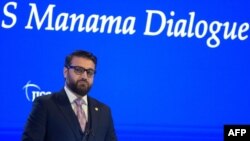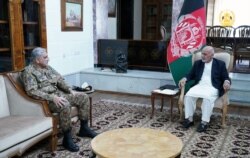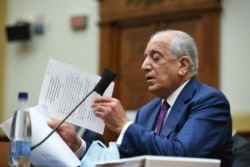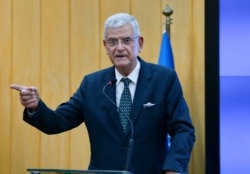Pakistan has conveyed to the leadership in Afghanistan it will no longer conduct official business with Kabul’s top national security chief because of his recent “abusive outburst” against Islamabad, highly placed officials and diplomatic sources confirmed to VOA on Friday.
The controversy has again highlighted political tensions and historic mistrust plaguing relations between the South Asian neighbors, which share a nearly 2,600-kilometer border.
The latest trigger came from Afghan President Ashraf Ghani’s national security adviser, Hamdullah Mohib, who routinely accuses Pakistan and its spy agency of supporting and directing the Taliban’s insurgency in Afghanistan, charges Islamabad rejects.
In a public speech earlier this month in eastern Nangarhar province, next to the Pakistani border, Mohib not only repeated his allegations but referred to Pakistan as Heera Mandi, a notorious red light district in the city of Lahore.
His remarks outraged leaders in Islamabad, who denounced them, saying they “debased all norms of interstate communication.”
A senior Pakistani official privy to the matter told VOA on condition of anonymity his government lodged a strong protest with the Afghan side and conveyed “deep resentment” in Pakistan over Mohib’s “undignified” remarks.
The official said Kabul has been told Islamabad, henceforth, would not hold bilateral engagements with the Afghan national security adviser. It has also been conveyed “by our side that Afghan side is not serious in engaging with Pakistan, but only in the blame game and degrading Pakistan’s sincere efforts,” the official added.
Afghan Vice President Amrullah Saleh while addressing a public gathering in the southeastern border province of Khost earlier this week indirectly confirmed Pakistan’s assertions.
In a video clip from the speech posted on social media, Saleh asserted that “a Western leader” recently telephoned Ghani and told him that Pakistan does not want to work with a “Pashtun leader in Afghanistan.” The vice president did not identify the foreign leader, nor did he name Mohib but the Afghan national security advisor is an ethnic Pashtun.
Diplomatic sources confirmed to VOA that Pakistan’s military chief General Qamar Javed Bajwa, during his visit to Kabul this month, had raised the issue in his meeting with Ghani in the presence of Nick Carter, Britain’s chief of the defense staff.
Mohib addressed a news conferences in Kabul Saturday where he was asked to respond to reports that Islamabad has ended official dealings with him.
“My team has seen media reports attributed to anonymous individuals. As of now, the government of Afghanistan has not been officially intimated about the issue,” the adviser said.
“The Afghan government will respond to it through relevant diplomatic channels whenever the information is formally conveyed to it,” Mohib added.
Carter has been engaged in facilitating contacts between the two countries to help ease tensions at a time when the United States and NATO allies have been withdrawing their troops from Afghanistan after 20 years of war with the Taliban.
An official Pakistani military statement following the May 10 meeting in Kabul confirmed it was held in the presence of Carter.
“Matters of mutual interest, current developments in the Afghan peace process, enhanced bilateral security and defense cooperation and need for effective border management between the two brotherly countries were discussed,” the statement said, but it did not say anything about the controversy stemming from Mohib’s remarks.
Analyst Said Azam, a former Afghan government official, described Mohib’s outburst as detrimental to the interests of Afghanistan and its people.
“It was insulting, first and foremost for himself, the government of Afghanistan, and also the people of Afghanistan. A common man in Afghanistan see their Pakistani neighbors as brothers and sisters. He went too rude and dirty to be honest,” Azam said.
Torek Farhadi, a political commentator and former Afghan government advisor, said Mohib’s insulting remarks exhibited his “immaturity” for his rank.
“These words do not reflect the language any dignified Afghan uses towards any nation, let alone a neighbor. They are regrettable,” Farhadi observed.
Washington had also stopped meetings with the Afghan national security adviser over controversial remarks he made on a visit to the U.S. two years ago, though contact has since been resumed.
Mohib had accused Zalmay Khalilzad, U.S. special representative for Afghanistan reconciliation, of undercutting the Kabul government in bilateral U.S.-Taliban peace negotiations.
Adam Weinstein, a research fellow at the Quincy Institute, said Pakistan’s decision does not bode well for bilateral ties. The former U.S. Marine who served in Afghanistan in 2012 wrote on Twitter Afghan officials need to exercise caution because any breakdown in ties will only add to the sufferings of their nation.
Khalilzad was leading the talks that culminated in an agreement in February 2020 with the insurgents, setting the stage for the foreign troop drawdown from the war-torn nation, which began on May 1 and is expected to be completed by Sept. 11.
Despite Pakistan's denials, senior U.S. and Western officials have publicly claimed that senior Taliban leadership lives in Pakistan. In an interview with Germany's Der Spiegel, Zalmay Khalilzad, the U.S. special representative for Afghanistan reconciliation, said:
"If this peace effort doesn't succeed, and if there is no agreement between Pakistan and Afghanistan, Pakistan will suffer. Pakistan will be blamed because so much of the Taliban’s leadership lives in Pakistan."
“Pakistan has played an important role in Afghanistan,” David Helvey, assistant secretary of defense for Indo-Pacific affairs, told the U.S. Senate Armed Services Committee last week. “They supported the Afghan peace process. Pakistan also has allowed us to have overflight and access to be able to support our military presence in Afghanistan.”
Islamabad has lately further relaxed visa restrictions for Afghans, created new border facilities to accelerate bilateral and transit trade with the landlocked country, and increased scholarships for Afghan students to study at Pakistani universities. Pakistani officials say the measures are meant to enhance bilateral ties in support of the Afghan peace process.
“I commend Pakistan’s leadership and its role in supporting the efforts to forge reconciliation, security and transition in Afghanistan,” Volkan Bozkir, president of the U.N. General Assembly, said Friday before concluding his three-day visit to Islamabad.
“We also know that lives of Afghanistan and Pakistan are now inextricably intwined. Peace in Afghanistan is an imperative for Pakistan to open trade routes to landlocked Central Asia. Peace in Afghanistan is critical for securing benefits from China-Pakistan Economic Corridor,” Bozkir said.
He referred to a Chinese-funded multibillion-dollar infrastructure development project in Pakistan, which Beijing intends to extend to Afghanistan to help in rebuilding efforts there.
Pakistan says it is making all possible efforts to promote Afghan peace, fearing that another round of civil war following the withdrawal of international forces would affect Pakistani security and economic development. The country already hosts nearly 3 million Afghan refugees and has concerns that more refugees will flood Pakistan if the conflict continues.
Editor's note: An earlier version of this article quoted Afghan National Security Adviser Hamdullah Mohib as having described Pakistan as a “brothel house.” In fact he used the name of a notorious red light district in Lahore which is widely understood as a metaphor for a place of prostitution.







